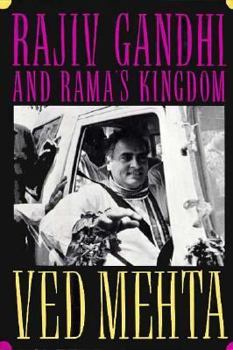Rajiv Gandhi and Ramas Kingdom
Select Format
Select Condition 
Book Overview
This elegantly written book by the renowned author Ved Mehta is a chronicle of a tumultuous dozen years of recent Indian history--from the unsettled conditions that preceded the assassination of Prime... This description may be from another edition of this product.
Format:Hardcover
Language:English
ISBN:0300060386
ISBN13:9780300060386
Release Date:November 1994
Publisher:Yale University Press
Length:194 Pages
Weight:0.85 lbs.
Dimensions:0.8" x 5.8" x 8.5"
Customer Reviews
3 ratings
Considerably Informative & Clearly Objective..
Published by Thriftbooks.com User , 18 years ago
Rajiv Gandhi, a scion to the world's most populous democratic monarchy was condemned, not by ambition but by circumstances, to be the ultimate prime minister of Independent India following the assassination of his mother Indira Gandhi. As a Prime Minister he was a naïve politician, of course not efficient in the games of diplomacy as his mother was, and by the time he was contesting the general elections of 1991, he had very much become a power hungry status seeking politician, whose reputation was by then already tarnished by allegations of corruption, and mistrust within his own immediate political circle. But this book is not just about Rajiv Gandhi; this is a book documenting the life of Indian politics from 1983-1993; an extremely important yet turbulent decade in the history of Independent India. The book begins with the infamous Indira Gandhi-Maneka Gandhi episode, the ostentatious 1982 Asian Games burkha veiled above the ugly face of Indian poverty, the government-led Operation Bluestar, and the retaliatory assassination of Mrs. Gandhi followed by the Hindu-Sikh riots running collaterally with the Sikh secessionist movements. The book also documents two important landmark judgments - the Bhopal Gas Tragedy and the Shah Bano case - laying a comprehensible background of the circumstances in which these cases occurred and the extent of unforeseeable repercussions they generated having a substantial impact on Mr. Gandhi's governance and his prime ministership. The book devotes some space to inform the reader of the Congress's precipitous decline in power resulting primarily from the blame attached to Mr. Gandhi and other Congress politicians in the Bofors scandal and the role of V. P. Singh in the uncovering of such a concealed scandal. Some episodes in the book are remote in the context of Rajiv Gandhi and his role as the head of government, but they are nonetheless important as they introduce the reader to some of the obscure challenges that India had faced and still continues to face as a `functioning democratic anarchy'. The last chapters of the book focus on the rise of Hindu extremism and the Hindu revivalist movements and the much controversial Ayodhya issue. Throughout the entire text, the author stays objective in his perspective, which makes this book a good informative study.
Needed, but problematic
Published by Thriftbooks.com User , 19 years ago
We do not have a good history of the period 1985-1995 in Indian history and yet it is a fascinating period. Not only is there Operation Bluestar and the Punjab crises, but also the problems in Sri Lanka, Kashmir and of course the rise of the BJP. This book begins with this backdrop to trace the rise and governance of Rajiv Gandhi, Indira Gandhi's son. His brother Sanjay was killed in a plane crash and Rajiv, by all accounts a mild mannered man, assumed the helm of the worlds greatest democracy. He did so against a back drop of communalism and poverty and other issues. This is a fascinating short read. One problem is the authors treatment of the BJP and the Ayodha case. A very biased opinion is given on the origins of the Ayodha temple and the dispute, with no regard to the history of India, the Islamic colonial occupation of the subcontinent and the rise of Hindu `nationalism'. Despite this drawback the book is a needed contribution to the paucity of books on India in the post independence period. Seth J. Frantzman
readable and informative
Published by Thriftbooks.com User , 22 years ago
A well-written study of the rise of the modern Hindu nationalist movement in relation to Rajiv Gandhi; including ways he distanced himself and ways he tried to pander to them to retain power.The book is actually broader than the title suggests, beginning with Indira Gandhi and the events leading up to her assassination, and looks at how Hindu nationalism revived after the assassination of Rajiv.Written from a journalist's perspective, the narrative moves smoothly and coherently at all times.If you are interested in modern Indian history, politics or religion, this book gives you a nice picture of this period of time (around 1984-1994), to help you understand how things in India got the way they are now.






